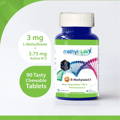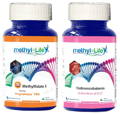Is there a Link Between Low Folate Levels and Dementia?
Browse Categories
Is there a Link Between Low Folate Levels and Dementia?
Recent research has shown that folate deficiency is common among older adults, with several studies suggesting a link between low folate, declining cognitive function, and mortality.
A 2018 study in Ireland revealed that one in seven adults over 50 is deficient in folate, and one in eight is deficient in vitamin B12. Both nutrients are essential for proper cognitive function, nerve function, and the production of red blood cells and DNA.
Further studies suggest that folate intake below the Recommended Daily Intake (RDA) may increase the risk of mild cognitive impairment and dementia later. However, some experts dispute this claim.
This article will explore the research that supports the link between low folate and dementia. We will also discuss recommendations for improving folate status, whether this is effective, and implications for those with MTHFR mutations.
Low Blood Folate’s Association with Cognitive Decline
Research into the association between folate and cognitive decline remains somewhat inconsistent. Some observational studies have found that higher B vitamin intake is associated with a lower risk of dementia, while others have found no link. However, there is also substantial evidence to suggest that folate deficiency increases the likelihood of cognitive decline and reduced neurological function.
A large cohort study found folate deficiency was associated with a 68% increased risk of dementia and a 2.98-fold increased risk of all-cause mortality - even when other conditions such as diabetes, vitamin B12 deficiency, cognitive decline, and depression were accounted for. However, the study authors also suggested that further research was needed.
A study involving 370 people without dementia aged 75 years and older found that both vitamin B12 and folate may be involved in developing Alzheimer’s disease. Still, the association was only detected when both vitamins were taken into account.
Could Low Folate be a Symptom Rather than a Risk Factor?

The high incidence of low folate in those with dementia may also be a result of reverse causation. The deficiency is a consequence of preclinical dementia rather than its cause. This theory is based on the fact that the neuropathological processes of dementia often begin many years before diagnosis, during which cardiometabolic changes, including weight loss, are common.
Older adults may be at a higher risk of nutrient deficiencies due to lower food intake, physiological and metabolic dysfunctions, medications, and other age-associated factors.
Having a higher body mass index during midlife may increase the risk of dementia, but some researchers suggest that weight loss during the preclinical dementia phase may make it difficult to identify these effects. Unintentional weight loss is common in patients with dementia and has also been linked to poorer disease outcomes.
Ultimately, a lower BMI before the onset of dementia could result in low folate, making it a symptom of preclinical disease rather than the actual cause of dementia.
Could Folate Supplementation be Helpful?
Some researchers have suggested that folate levels should be monitored in older adults, and a deficiency should be treated as part of a therapeutic strategy. However, debate continues as to whether folate and/or vitamin B supplementation can improve cognition or slow the rate of brain atrophy in Alzheimer’s and/or mild cognitive impairment by lowering homocysteine levels.
Folate supplementation may indeed be beneficial. One study showed that folate works alongside Donepezil in improving cognition and markers of inflammation. As inflammation is central in the pathogenesis of dementia, folate supplementation may help reduce the risk.
Studies have shown that folic acid supplementation to patients with mild cognitive impairment can significantly improve cognitive performance, including information processing speed and memory, which typically decline with age.
The Baltimore Longitudinal Study of Aging found that adequate folate significantly decreased the risk of Alzheimer’s disease. The 35.1% of participants who met their daily folate requirements had a 60% reduced risk of developing Alzheimer’s. A similar study found that as folate concentration in Red Blood Cells (RBCs) increased, the individual’s relative risk of cognitive impairment and dementia decreased.
A 2021 systematic review and meta-analysis indicated that folate levels are lower in Alzheimer’s patients than in controls. Also, sufficient intake of folate was a protective factor against Alzheimer’s.
However, a meta-analysis of 11 trials and 22,000 individuals concluded that B-vitamins do not influence cognitive aging in older people.
What are the Implications for People with MTHFR?
MTHFR mutations result in abnormal intracellular folic acid metabolism, which may result in low folate. Adequate levels of folate and B12 are needed to maintain not only normal homocysteine levels but for proper methylation reactions.
Several studies have associated dementia with elevated homocysteine levels and concurrent low levels of folate and vitamin B12. MTHFR gene mutations are also found to occur in most elderly patients with memory loss.
Elevated homocysteine is considered a strong risk factor for dementia and cognitive decline in the elderly, particularly in association with low levels of folate and cobalamin.
One study suggested that the MTHFR C677T gene may be linked to Alzheimer’s disease (AD) pathogenesis. A meta-analysis of 11 studies found a strong association between vascular dementia and the C677T gene polymorphism.
However, another study found that MTHFR C677T was not associated with an increased risk of vascular dementia or Alzheimer’s disease.
Despite this inconclusive evidence, those with MTHFR mutations would be well-advised to maintain folate levels through supplementation with methylfolate. Methylfolate is a bioavailable form of the nutrient that has been shown to bypass the MTHFR deficiency. It requires no further conversion and is available for immediate use in the body.
Choosing the right methylfolate supplement can be tricky. Some of the best-known methylfolate formulations are available in the Methyl-Life® range, along with additional cognitive support in the form of multivitamins and B12. Methyl-Life® also offers a Brain Bundle, which includes their best-selling L-Methylfolate (5mg) and Active B12 Hydroxocobalamin (2.5mg) in one convenient 3-month-supply package.
Methyl-Life® also provides comprehensive information about each of its products, especially folate’s role in supporting the mind and body.
Updated On: June 6, 2022
Share This Article

